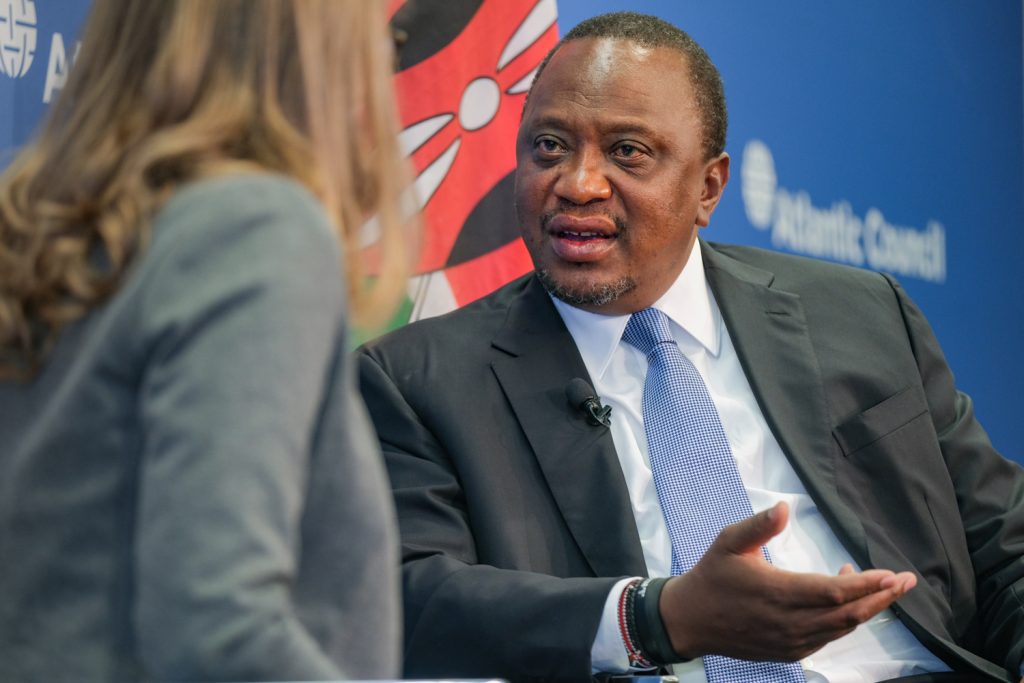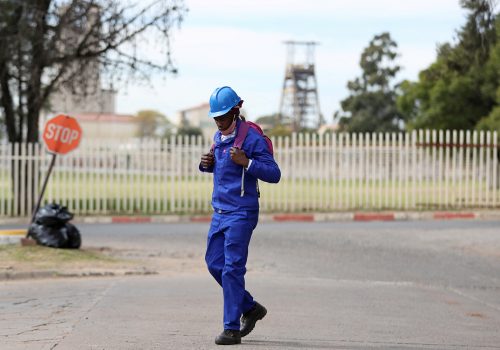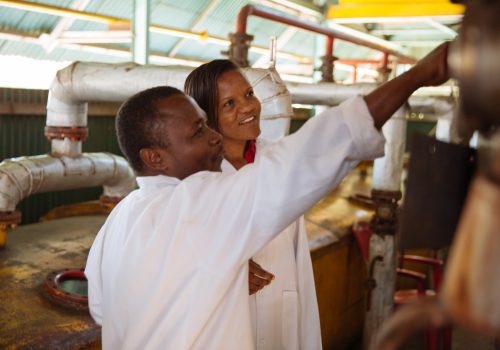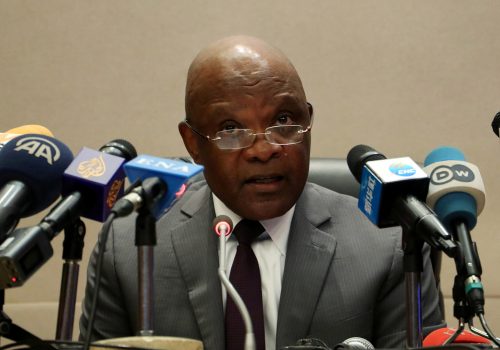Kenyan President Uhuru Kenyatta said African nations urgently need “fiscal space” so they can cope with the enormous economic demands unleashed by the coronavirus pandemic.
Kenyatta spoke June 18 in an Atlantic Council Front Page event with Katrina Manson, US foreign policy and defense correspondent for the Financial Times. The one-hour webcast—sponsored by the Atlantic Council’s Africa Center—comes as Africa is grappling with the health and economic effects of the global coronavirus pandemic, and occurred only minutes before a tense, second-round United Nations vote that allocated a coveted rotating seat on the UN Security Council to Kenya over the objections of neighboring Djibouti.
As of June 18, Kenya had confirmed 4,257 cases of the disease—up 32 percent in the past week—and 117 deaths.
“Coronavirus is mainly a health issue, and our key focus is ensuring that we keep our people safe,” he said. “But this is also an economic crisis because it has resulted in some key sectors hugely affected by lockdowns. We were forced to close our airspace, which affected tourism, a very critical part of our economy.”
As a result, Kenya’s gross domestic product will grow by only 1.5 percent this year and possibly shrink by 1 percent instead of expanding by 5 percent—as the World Bank had predicted—in the wake of lower tourism and agriculture earnings as well as reduced remittances.
“It’s unfortunate that this crisis comes at a time when so many global tensions and trade wars are going on,” Kenyatta said. “Let’s not be sucked back into isolationism or unilateralism. We need each other today more than ever. We’re not going to fight coronavirus if one country fails and another succeeds. We must succeed together—because the one that fails will come back and infect all of us.”
Kenyatta hailed a China-Africa “summit on solidarity” against COVID-19 held via video link and led by Chinese President Xi Jinping.
“Our position to the Group of Twenty (G20) is that Africa needs space. Kenya, like many African countries, is under fiscal pressure. [The coronavirus crisis] comes at a time when we as a country were focusing on very serious austerity measures to reduce our deficit,” Kenyatta said. “We’re not looking for debt relief; we are saying we just want fiscal space and time to get our economy up and running again. In our meeting yesterday, China endorsed that position.”
Asked how he views China’s rapidly increasing footprint in Africa—which has raised alarms in Washington—Kenyatta said his country is open to doing business with everyone.
“There is opportunity on the African continent. China has taken advantage of that opportunity. The West has really been focused more on themselves. And I have always said, these opportunities that China is seeing on the African continent are also equally available to our American partners,” he said.
“We are not specifically targeting one part of the world against another,” he said. Africa has “a young population that is dying for jobs [and] in need everything from toothpaste and toothbrushes to cars and technology.”
To that end, Kenyatta reiterated his support for a free-trade agreement (FTA) with the United States. On February 6 – just a day after appearing for the first time at the Atlantic Council – he and US President Donald Trump announced their intent to open talks on an FTA that would serve as the model for all future US trade deals with Africa.
“Kenya has been fighting for an FTA for Africa, a market of over one billion people. But with fifty-four countries, we’re all very small markets,” he said. “We have already successfully negotiated an African free-trade arrangement. While the US was keen to start off negotiations between our two countries, we made it very clear that they would have to be done without undermining this arrangement.”
Kenya, home to 53.7 million people, already ranks seventh in population among African nations, with a median age of 20.1 years. By 2050, it’s projected to have 95 million inhabitants, making it among the world’s twenty most populous countries.
“This is not going to be like AGOA,” he said in reference to the African Growth and Opportunity Act, a US law passed in 2000 that significantly enhances US market access to sub-Saharan African countries; it has since been renewed to 2025. “We knew AGOA was going to come to an end at some stage. Kenya will be the first under this new arrangement; we’ll be trailblazers. We hope others will follow through.”
Kenyatta spoke as he awaited news of his country’s quest for a temporary seat on the United Nations Security Council. Kenya, whose candidacy enjoys the backing of the African Union, is vying with Djibouti in a second round of voting for the one non-permanent seat traditionally allocated to Africa. A few hours later, Kenya clinched the vote; Kenyatta said his country deserves nothing less.
“Since independence, Kenya has consistently been engaged with global partners to bring peace and stability to distant parts of the world where we have sent peacekeeping troops,” he said, recalling how Kenya accepted refugees from various wars in Rwanda, Uganda, and Ethiopia. “The process that led to independence for South Sudan started in Nairobi, as did the process that led to talks in Somalia. We have always encouraged peace, stability, and progress; this is what we are known for in a region of instability.”
The UN vote aside, what really matters right now, Kenyatta said, is “peace in Somalia, supporting the young government in South Sudan, fighting terrorism—which is a fact of life—and most importantly, working with our neighbors to confront COVID-19.”
Manson asked Kenyatta if he had a message for Americans protesting police brutality in the wake of George Floyd’s May 25 killing in Minneapolis.
“We are very clear: all lives matter. But there should be no targeted oppression of any group in society. We can’t afford to have anybody feeling left out, or left behind. We have seen what happens when communities clash with each other,” Kenyatta said, alluding to the ethnic violence following Kenya’s 2007 presidential elections, in which up to 1,500 people died and as many as 600,000 were displaced.
“We have seen a number of cases [in Kenya] where oversight authorities have taken action against police officers. I will admit, we’re not 100 percent there yet, but we do acknowledge that policing and communities must be brought closer together than they’ve been in the past,” he said. “What we have witnessed in America only makes that reality that much sharper.”
Manson concluded by asking Kenyatta whether he’d attempt to “do a Putin” and remain in office—either as president or in the new role of prime minister created as a result of a possible constitutional referendum—after his five-year term ends in 2022.
“If there is one thing that Kenyans are very, very clear about, [it’s our] two-term limit,” the president replied. “There’s been no single president [who] has broken that, and I don’t intend to be the first.” When Manson inquired whether that meant he was also ruling out becoming prime minister, he responded that this was a question he couldn’t answer. “I have no clue whether there is going to be a premiership in the constitution,” he said.
Larry Luxner is a Tel Aviv-based freelance journalist and photographer who covers the Middle East, Eurasia, Africa and Latin America. Follow him on Twitter @LLuxner.
Further reading:
Image: President of Kenya Uhuru Kenyatta speaks at the Atlantic Council on February 5, 2020.



